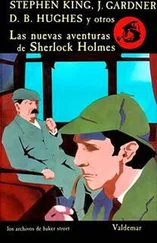“I am delighted to make your acquaintance, Mr. Holmes,” the Theosophist said. “And yours, too, of course, Dr. Watson. I have enjoyed reading your accounts of Mr. Holmes’s amazing deductive feats.”
I made the proper murmurs of self-deprecation, but I felt a glow of pride that my writings should be known in the hinterlands.
We did not speak of the problems at Lomaland. Instead, Mrs. Tingley turned to Holmes and said, “I understood from Dr. Watson’s accounts of your adventures that you are a man who appreciates music. I should like you to know that at Point Loma music is regarded as much more than an amusement. It is a part of life itself, and it is one of those subtle forces of nature which, rightly applied, calls into activity the divine powers of the soul. Do you not agree, Mr. Holmes?”
Holmes did agree, warmly, and soon he was listening with great attention and respect to the methods of musical education employed at the Raja Yoga Academy. Only after the remains of our light luncheon were cleared away did the talk turn to the reason we had come. Mrs. Tingley said in her firm voice that she was grateful to the Spaldings for inviting Holmes to protect her, but that she had full confidence in Grace Imbler, the head beekeeper. “Indeed, she has promised me a treat tomorrow-fresh honey in the comb. We pasteurize most of our honey, but honeycomb is a special favorite of mine, and she always saves me some before she bottles the rest for the kitchen and the store.”
We stepped away from the lunch table, thanked the Spaldings, and stepped out onto the circular porch. Down the steep, chaparralovergrown canyon, a sliver of beach received silver-capped waves.
“I am eager to show you our community, Mr. Holmes,” Mrs. Tingley said. “I think you will find it to your taste as a man of intellectual pursuits.” Mrs. Tingley walked toward a large square building that from a distance looked like marble, but was wood covered in white stucco. Three smaller domes rose from the towered corners, and the edifice was topped by a huge aquamarine dome some three hundred feet in circumference.
“We call this the Homestead,” she told us. “It is our headquarters. The small round building is our Temple.” The Temple was no less impressive, and boasted two tiers of Greek columns, crowned by a spacious dome of amethyst.
Music sounded in the distance, but strange and discordant. I asked Mrs. Tingley about it and she smiled. “Our practice rooms,” she explained. “Our students practice together, but they do not always play the same pieces. It is part of their discipline, to play their own music without allowing themselves to be distracted by their fellows.”
I glanced at Holmes. A slight frown between his eyes gave evidence that he was disconcerted by the cacophony. What sort of music would the students play if they practiced in such chaos?
Children, young and old, passed us by, the younger ones walking in neat rows, attended by adults I assumed were teachers. They wore uniforms similar to those worn by any schoolchild, and I found myself almost disappointed that they were not in togas or saris or something equally outlandish.
Mrs. Tingley made up for the conventional costumes by referring to the young pupils as “Lotus Buds.” Holmes’s thin lips twitched in a near smile.
We learned that the small round buildings with mushroom-cap roofs were Lotus Houses, where the children lived. They did indeed live apart from their parents, who could visit them on weekends. This struck me far more humane than the British tradition of sending children as young as six to boarding schools several hundred miles from home.
We walked west, in the direction of the privately operated tent city. The land was hilly, and large canyons covered in scrub opened the vista to the sea. In the distance, I could see small white boxes and a larger whitewashed building without decorative accents. Next to me, Holmes pointed and said, “The apiary, I presume.”
I was surprised and then realized I’d been visualizing the beehives of my youth, the moundlike skeps made of hay that dotted the English countryside.
“Nothing we do here is done purely for the sake of commerce,” Mrs. Tingley said as we continued strolling along the bluff. “Our bee farm is not merely a source of honey, but also of inspiration. The bees have much to teach humanity about the virtues of cooperation and hard work.”
She stopped walking and said, “This is where I live. I have some correspondence I must attend to. I will leave you to meet Mrs. Imbler on your own. Follow the path just past the theatre.”
My eyebrows must have gone up, for Mrs. Tingley said, with more than a touch of pride, “We have just built the first Greek theatre in the New World, Dr. Watson.”
Not only a theatre, but a Greek theatre! I saw wooden benches cut into the hillside, focused on a small flat patch of ground that served as a stage. I could not but marvel at the sight of an open-air theatre in the ancient Greek mode sitting on land once occupied by red Indians.
Holmes and I bade farewell to Mrs. Tingley, who went into her house, a much more modest affair than the Spalding mansion, and we made our way down the hill toward the neat rows of white boxes to meet the lady who might or might not be plotting Mrs. Tingley’s demise.
As we drew closer, we smelled an overpowering sweetness in the air. Holmes remarked, “This must be the honey house” and strode forward to knock on the door.
Mrs. Imbler, a stout lady whose face and arms were brown from the intense sun, opened the door a fraction and peered out at us. She seemed distracted and not particularly pleased to have visitors, but she invited us inside after Holmes mentioned the magic name of Tingley. With forced good grace, Mrs. Imbler showed us how she used a heated knife to cut through the beeswax, and extract the honey, which drained into a can below the table. Heat would be applied to separate honey from melted wax and keep the honey from granulating. It was clear she’d given this tour before, but equally clear that she wanted to cut it short and send us on our way.
“I’m about to open the hives and check on my queen larvae,” she said. “Queen work is the most exacting part of bee culture.” Her tone said she would much rather perform these duties in solitude.
“I’m told beekeeping is farming for the literary soul,” Holmes remarked. “Indeed, I recall reading about honeybees in Virgil’s Fourth Georgic at school.”
A thin-lipped smile graced Mrs. Imbler’s weathered face. “In the first place, Mr. Holmes, no one really ‘keeps’ bees. Bees deign to live in our hives and allow us to steal some of their honey, but they are far from domesticated. In the second place, your Virgil was quite wrong when he wrote of ‘kings’ and ‘warriors’ in the hive. The queen rules the colony, and all the workers are female.”
Mrs. Imbler seemed to come to a decision about our presence. She reached for one of the veiled beekeepers hats, which hung from wooden pegs on the wall nearest the door. She put it on and offered two others to Holmes and me. We put the hats on and secured the netting at chest-height with a strap. Mrs. Imbler took the extra precaution of putting on heavy gloves that reached to her elbow. She picked up an odd-looking metal canister with a bellows at one end and a conelike protrusion over the top. Smoke emerged from the cone. In her other hand, she held a long rectangular piece of metal.
“Come along,” she said briskly and opened the door.
We stepped from the dimness of the honey house into the sun. Through the veil, the sharp-edged landscape took on a gauzy, painterly tone. It was as if a gentle fog had descended over Point Loma. I decided I liked the muted landscape better than the harsh one revealed by the California sun. Mrs. Imbler led the way toward the neat rows of whitepainted boxes that lay nestled at the bottom of the canyon, about fifty feet from the water’s edge. As we approached the hives, the sound of buzzing filled my ears. It was an otherworldly sound, and I found myself unable to conjure up a comparison. It was as loud as a foghorn on the Thames, as menacing as a tiger’s roar, as angry as a raging mob. The hairs on the back of my head stood up, and I felt a fear so primitive that it shocked me.
Читать дальше












